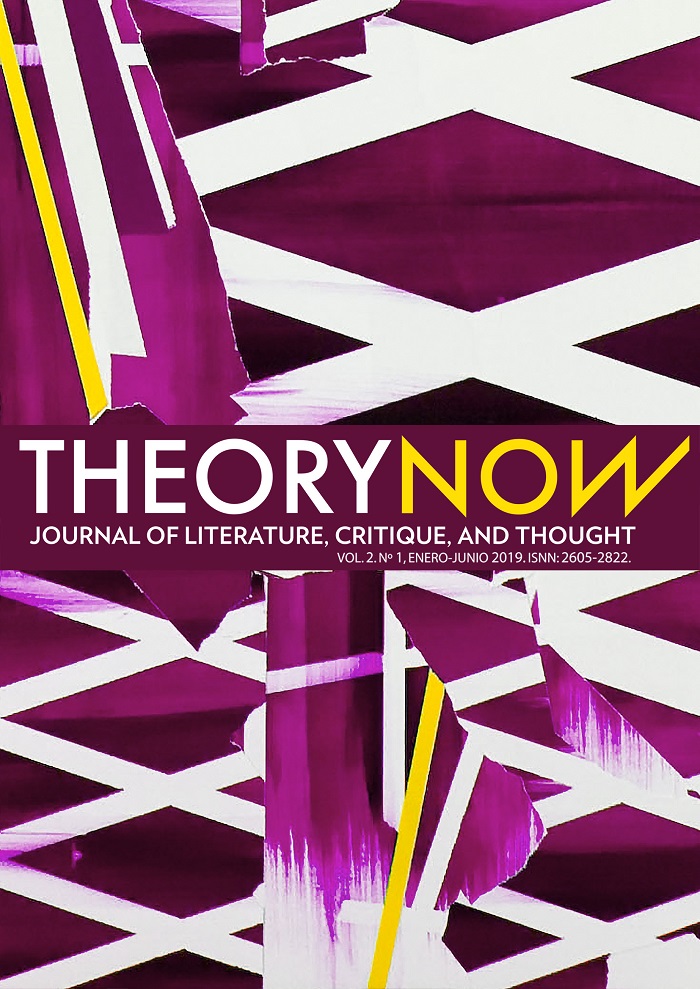“Exiled from all Gregarity”: Profane Love, Poetics and Political Imagination in Barthes and Agamben
DOI:
https://doi.org/10.30827/tnj.v2i1.8522Keywords:
Love, Literary theory, Agamben, Barthes, Imagination, Post-secular, Homo-Sacer, Poetry.Abstract
This article offers the literary and philosophical concept of “profane love”, following the juxtaposition of Giorgio Agamben’s concept of singular love and his political and poetic project of profanation, with the figurative and scattered notions of love found in Roland Barthes A Lover’s Discourse: Fragments. The article opens with a critique of the discursive state of love today and its relation to politics and power. Following Barthes idea of an obscene and Agamben’s notions of profanation and exposure, the article argues that love should be thought of as an experience in passivity that happens in the encounter and touch of two separate singularities. This process, the article argues, involves the imagination, and as such is thought of with regard to political and poetic imagination. The article thus thinks of Agamben’s notoriously pessimistic figure of the Homo-Sacer – the abandoned man – in a new light. It argues that the lover, as a participant in a radical experience of passivity and exposure, can also be thought of as abandoned, offering an affirmative perspective on Agamben’s political thought.Downloads
References
Agamben, Giorgio. The Coming Community. Minneapolis: University of Minnesota Press, 2007.
_______. Homo Sacer: Sovereign Power and Bare Life. Stanford, Calif: Stanford University Press, 1998.
_______. The Idea of Prose. Albany: State University of New York, 1985.
_______. Nymphs. London: Seagull, 2013.
_______. Nudities. Stanford: Stanford California Press, 2011.
_______.The Open: Man and Animal. Stanford, California: Stanford University Press, 2004.
_______. Potentialities: Collected Essays in Philosophy. Stanford, Cal: Stanford University Press, 1999.
_______. Profanations. New York: Zone Books, 2015.
_______. Remnants of Auschwitz: The Witness and the Archive. New York: Zone Books, 1999a.
_______. The Adventure. Cambridge, Massachusetts : The MIT Press, 2018.
_______. The Church and the Kingdom. London: Seagull, 2012.
_______. The End of the Poem: Studies in Poetics. Stanford, Calif: Stanford University Press, 1999.
_______. The Fire and the Tale. Stanford: Stanford University Press, 2017.
_______. The Idea of Prose. N.Y: State University of New York press, 1995.
_______. The Man Without Content. Stanford, Calif: Stanford University Press, 2008.
_______. The Use of Bodies. Stanford, Calif: Stanford University Press, 2015a.
Ahmed, Sara. The Cultural Politics of Emotion. Edinburgh: Edinburgh University Press, 2014.
Alter, Robert. “The Garden of Metaphor”. The Art of Biblical Poetry, New York: Basic Books, 2011, pp. 185-203.
Badiou, Alain, Nicolas Truong, and Peter R. Bush. In Praise of Love. New York: New Press, 2012.
Barthes, Roland. A Lover’s Discourse: Fragments. London: Penguin Books, 1977.
Belsey, Catherine. Desire: Love Stories in Western Culture. Oxford: Blackwell, 1994.
Cadava, Eduardo and Cortes-Rocca, Paola. “Notes on Love and Photography”. October, vol. 116, Spring 2006, 3-34.
Graeber, David and Wengrow, David. “How to Change the Course of Human History”. https://www.eurozine.com/change-course-human-history/
Heath, Stephan. “Barthes on Love”. SubStance, Vol. 11/12, Vol. 11, no. 4 - Vol. 12, no. 1, Issue 37-38, 1982/1983, 100-106.
Illouz, Eva. Cold intimacies the making of emotional capitalism. Cambridge: Polity 2017.
______. Why love hurts: a sociological explanation. Cambridge: Polity, 2015.
Jacobson, Roman (1960), “Closing Statements: Linguistics and Poetics". Style In Language, edited by Thomas A. Sebeok, Cambridge Massachusetts, MIT Press, 1960, pp. 350–377.
Nancy, Jean-Luc, and Peter Connor. The Inoperative Community. Minneapolis, Minn: University of Minnesota Press, 1991.
Parsley, Connal. “'a Particular Fetishism': Love, Law and the Image in Agamben”. Giorgio Agamben: Legal, Political and Philosophical Perspectives, edited by Frost, Tom, New-York: Routledge, 2013, pp. 31-53.
Plato. The Symposioum. Project Gutenberg, internet source, http://www.gutenberg.org/files/1600/1600-h/1600-h.htm.
Prozorov, Sergei. Agamben and Politics: A Critical Introduction. Edinburgh: Edinburgh Univ. Press, 2014.
Solomon, Robert C. “A Lover’s Reply (To Roland Barthes’ A Lover’s Discourse)”. Philosophy and Desire, edited by Silverman, Hugh J., New York: Routledge, 2000, pp. 143-158.
Unger, Steven. “The Professor of Desire”. Yale French Studies, No. 63, 1982, 80-97.
Zamir, Tzachi. Double Vision: Moral Philosophy and Shakespearean Drama. Princeton: Princeton University Press, 2012.
Whyte, Jessica S. Catastrophe and Redemption: The Political Thought of Giorgio Agamben. Albany: SUNY Press, 2013.
Wolfreys, Julian. “Face to Face with Agamben; or, the Other in Love”. The Work of Giorgio Agamben: Law, Literature, Life, edited by Justin Clemens, Nicholas Heron and Alex Murray, Edinburgh: Edinburgh University Press, 2008, pp. 149-163.
Downloads
Published
How to Cite
Issue
Section
License
Theory Now. Journal of Literature, Critique, and Thought is an immediate open-access publication which is available at no cost for readers and authors alike. Authors are not charged any kind of fee for the editorial processing of their articles. Reading, downloading, copying, distributing, printing, searching, linking or reusing all published articles for non-commercial uses is allowed on the condition of citing the author, the journal and the editing body. All intellectual material published in this journal is protected under a Creative Commons Attribution-NonCommercial 3.0 Spain license.
Dissemination of the articles in social (Facebook, Twitter, Linkedin, etc.) and scientific networks (ResearchGate, Academia.edu, etc.), public repositories at universities and other institutions, blogs, personal or institutional websites, Google Scholar, ORCID, ResearchID, ScopusID, etc. is strongly encouraged. In all cases, the intellectual property of the articles and any possible monetary profits derived from them belong exclusively to the authors.













